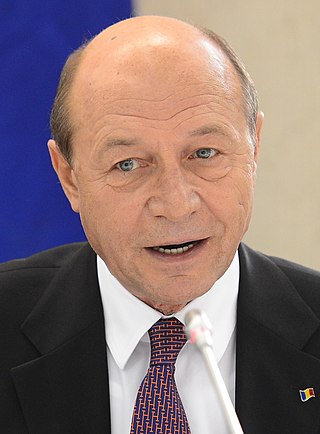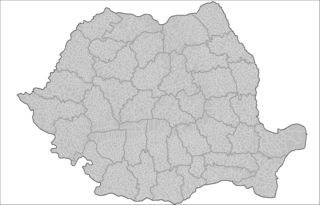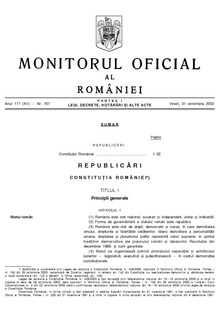
Romania's political framework is a semi-presidential representative democratic republic where the Prime Minister is the head of government while the President, according to the constitution, has a more symbolic role, is responsible for the foreign policy, signs certain decrees, approves laws promulgated by the parliament, and nominates the head of government. Romania has a democratic, multi-party system, with legislative power vested in the government and the two chambers of the Parliament, more specifically the Chamber of Deputies and the Senate. The judiciary is independent of the executive and the legislature. From 1948 until 1989, the communist rule political structure took place in the framework of a one-party socialist republic governed by the Romanian Communist Party (PCR) as its only legal party.

The prime minister of Romania, officially the prime minister of the Government of Romania, is the head of the Government of Romania. Initially, the office was styled President of the Council of Ministers, when the term "Government" included more than the Cabinet, and the Cabinet was called the Council of Ministers. The title was officially changed to Prime Minister by the 1965 Constitution of Romania during the communist regime.

The president of Romania is the head of state of Romania. Following a modification to the Romanian Constitution in 2003, the president is directly elected by a two-round system and serves for five years. An individual may serve two terms. During their term in office, the president may not be a formal member of a political party. The president of Romania is the supreme commander of the Romanian Armed Forces.

Traian Băsescu is a Romanian conservative politician who served as President of Romania from 2004 to 2014. Prior to his presidency, Băsescu served as Romanian Minister of Transport on multiple occasions between 1991 and 2000, and as Mayor of Bucharest from 2000 to 2004. Additionally, he was elected as leader of the Democratic Party (PD) in 2001.
Romania does not allow same-sex marriage or civil unions. In June 2018, the European Court of Justice ruled that under certain circumstances same-sex spouses of European Union citizens should be granted a right of residency in Romania. The Constitution of Romania does not define marriage directly, but Article 48 of the Constitution defines marriages between "spouses" as the foundation of the family.

Presidential elections were held in Romania in 2009. They were the sixth presidential elections held in post-1989 Romania. The first round took place on 22 November, with a run-off round between the top two candidates Traian Băsescu and Mircea Geoană on 6 December 2009. Although most exit polls suggested a victory for Geoană in the runoff, the authorities declared Băsescu the narrow winner with 50.33% of the votes. To date, it is the closest presidential election in the political history of Romania.

A presidential impeachment referendum was held in Romania on 19 May 2007 in order to determine whether president Traian Băsescu should be forced to step down.

The Székely Land (Szeklerland) is a historic and ethnographic region in Eastern Transylvania, in the center of Romania. The primary goal for the Hungarian political organisations in Romania is to achieve Székely autonomy. The Szeklers make up about half of the Hungarians in Romania and live in a compact ethnic bloc. According to official data from Romania's 2011 census, 609,033 persons in Mureș, Harghita, and Covasna counties consider themselves Hungarian. The Székelys (Szeklers), a Hungarian sub-group, are mainly concentrated in these three counties.

Gabriel Oprea is a Romanian politician and a general in the army reserves. The former president of the National Union for the Progress of Romania (UNPR) and a former member of the Social Democratic Party (PSD) who is now an independent, he was a member of the Romanian Chamber of Deputies for Ilfov County from 2004 to 2012 and was a Senator for Bucharest from 2012 to 2016.

Victor Viorel Ponta is a Romanian jurist and politician, who served as Prime Minister of Romania between his appointment by President Traian Băsescu in May 2012 and his resignation in November 2015. A former member of the Social Democratic Party (PSD) and its leader from 2010 to 2015, he was also joint leader (2012–2014) of the then-governing Social Liberal Union (USL), an alliance with the National Liberal Party (PNL). Ponta was a member of the Romanian Chamber of Deputies for Gorj County from 2004 to 2020. In the Emil Boc cabinet, he was Minister-Delegate for Relations with Parliament from 2008 to 2009.
Lucian Croitoru is a Romanian economist. On October 15, 2009, following the defeat of Emil Boc's government through a motion of no confidence, President Traian Băsescu nominated Croitoru to be Prime Minister of Romania. The nomination was opposed by a majority of Parliament, which adopted a declaration asking for his withdrawal, and vowing support for the candidature of Klaus Iohannis. Croitoru assembled a proposed cabinet, but this was voted down by Parliament on November 4.

The Commission for constitutional reform is a commission instituted in Moldova by acting President Mihai Ghimpu to adopt a new version of the Constitution of Moldova (1994).

Presidential elections were held in Romania in 2014. They were the seventh presidential elections held in post-1989 Romania. In the first round of the elections on 2 November, the top two of the fourteen candidates qualified in a run-off on 16 November. These candidates were Victor Ponta, former Prime Minister and ex-leader of the Social Democratic Party (PSD) who won around 40% of the vote in the first round, and Klaus Iohannis, then mayor of Sibiu and leader of the Christian Liberal Alliance (ACL), who won around 30% in the first round respectively. Following large protests on how Ponta's government organized the elections in the diaspora, Klaus Iohannis staged a surprising come-back and won the run-off with 54.5%, or more than a million votes than his contender.

A referendum on impeaching President Traian Băsescu was held in Romania on 29 July 2012. The referendum was required after Parliament voted in favour of impeaching Băsescu on 6 July, and had to take place within a month. It was the second referendum on impeaching Băsescu, the first having been held in May 2007, in which 74% of voters chose to keep him in office. Băsescu was later narrowly re-elected in 2009.

A constitutional referendum was scheduled to take place in Romania at the end of 2015. The Constitution amended by the Social Liberal Union (USL) lawmakers received some criticism, mostly from the opposition Democratic Liberal Party (PDL) backed by outgoing President Traian Băsescu, who expressed his discontent with some articles that reduce the powers he enjoyed while in office and eliminate the President from the executive power system.

The 2012–2015 unrest in Romania refers to a prolonged period of civil unrest and political scandals in Romania, which took magnitude after the second half of the 2000s. The wave of civil demonstrations started in January 2012, once with the introduction of a new health reform legislation. The protests were fueled by the austerity measures applied in May 2010, but also by the unpopularity of Băsescu-backed Boc government. The demonstrations were characterized by widespread rioting and acts of vandalism. The political situation precipitated, so Prime Minister Emil Boc decided to step down on 6 February 2012.

Coaliția pentru Familie is an association of about 30 Romanian non-governmental organizations. It seeks to promote the traditional family, and it is also involved in the anti-abortion movement.
A referendum took place in Romania on 6 and 7 October 2018 regarding the definition of the family in the Romanian Constitution. The referendum asked voters whether or not they approve a change to the family's definition as provided by Article 48 of the Constitution, to prohibit same-sex marriage. At the same time, a name referendum was held in the Olt County for renaming it to "Olt-Romanați County".

A consultative referendum took place in Romania on 26 May 2019, on the same day as the European Parliament elections, about whether to prohibit amnesties and pardons for corruption offences, as well as whether to prohibit the Government from passing emergency ordinances concerning the judiciary and to extend the right to appeal against them to the Constitutional Court. Both proposals were approved by wide margins.
















